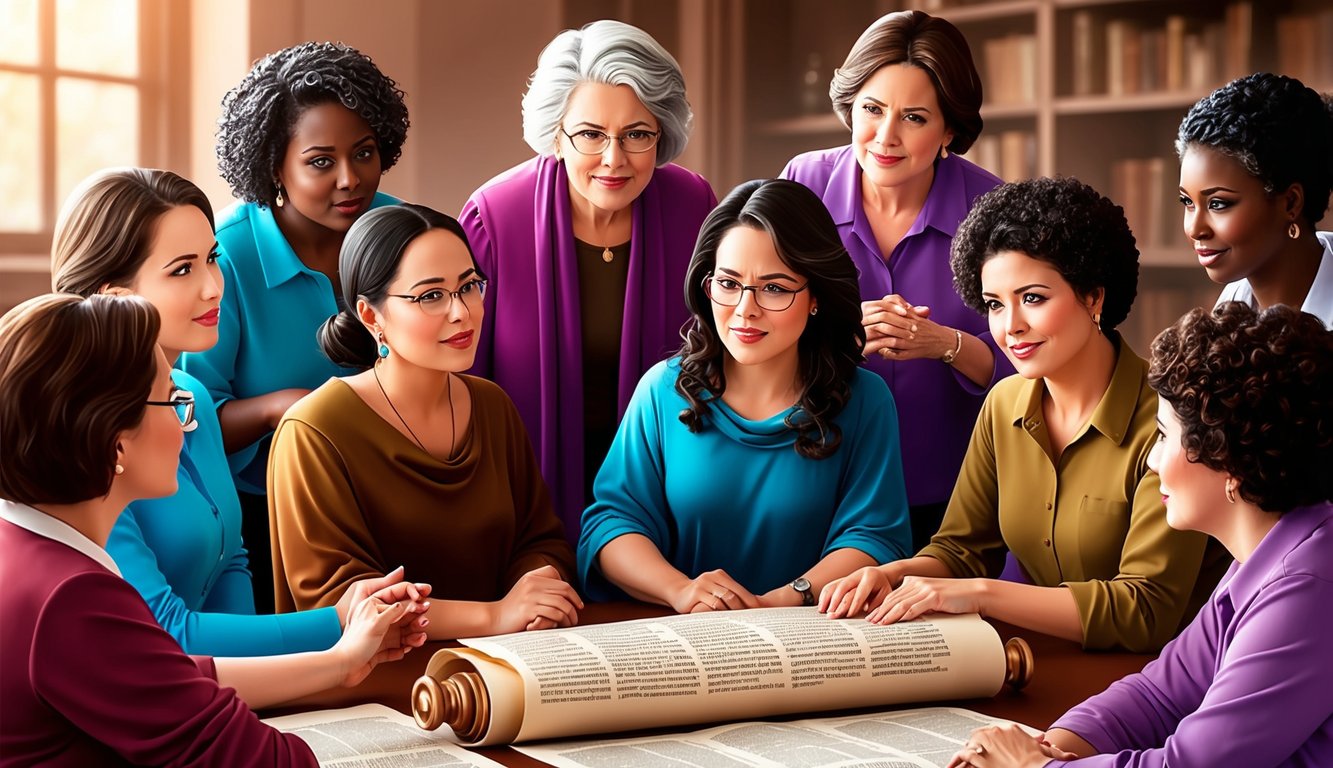Don’t Miss Out On This Unique Astrological Opportunity
Are you tired of spinning your wheels and getting nowhere? Simply put, you’re out of sync: you’re out of alignment with your astral configuration.
But: there’s a kind of map that can help you reclaim your alignment. Think of it as your own personal blueprint to success and happiness: a blueprint that will help you live your most amazing life.
Get started here.
Exploring the lives of women in the Bible opens up a world where courage, faith, and perseverance come to life through incredible stories.
These women often shaped history by influencing key events and decisions, leaving their mark on religious teachings and beliefs. Their strength and faith provide valuable lessons and inspire modern readers.
They offer insights into gender roles and relationships within ancient texts.
As you dive into these narratives, you’ll discover how women like Miriam, Esther, and Mary played pivotal roles, not only within the context of their time but also how their stories continue to resonate today.
These inspiring figures reflect the complex and dynamic roles women played in shaping religious and societal structures.
You’ll uncover how their actions and faith were intertwined with worship and devotion, serving as role models for various communities.
Understanding their impact on the socio-religious context allows you to appreciate the multi-dimensional aspects of these biblical stories.
Through the lens of judgment and redemption, women in the Bible reveal lessons about leadership, moral courage, and resilience in the face of challenges.
Their experiences highlight the importance of dignity and the role they played in shaping their communities despite societal limitations.
By exploring Bible verses about respect, we can see how these narratives emphasize the value of honoring others, regardless of gender or status.
These stories continue to inspire modern readers to uphold principles of fairness, integrity, and faith in their own lives.
Key Takeaways
- Women in the Bible demonstrated faith and strength.
- Influential women shaped religious and societal history.
- Their stories continue to inspire and teach valuable lessons.
Prominent Women and Their Impact
Prominent women in the Bible played key roles in their communities and left lasting influences through their faith, courage, and leadership.
Their stories highlight their significant contributions and the impact they had on the people around them.
Ancestral Matriarchs and Their Legacies
Women such as Eve and Sarah hold important places as matriarchs of biblical history.
Eve, often seen as the mother of all humankind, carries the weight of the first sin, yet also starts the human story.
Sarah, wife of Abraham, showed resilience and faith by supporting Abraham’s journey and became the mother of Isaac.
Her story highlights the faith and patience required for the realization of God’s promises.
Exploring these women’s roles gives insight into their lasting legacies within biblical narratives.
Courageous Women Who Shifted Biblical Narratives
Courage marked the lives of women like Rahab and Esther, who used their positions to influence events.
Rahab, once a harlot, helped Israel by protecting its spies, an act that would change the course of her life and the Israelites’ journey.
As a result, she became an ancestor of King David, demonstrating her far-reaching impact.
Esther’s bravery saved her people from a plot to destroy them.
Her story exemplifies courage in the face of danger and strategic thinking.
These accounts show how individual actions can alter greater historical narratives.
Prophetesses and Their Divine Roles
Women such as Deborah and Miriam held significant religious roles.
Deborah served as a judge and prophetess, leading Israel to military victory with her guidance and wisdom.
Her leadership is a testament to female capability in spiritual and practical matters.
Miriam, the sister of Moses, played an important role during the Exodus, offering support and guidance to the Israelites.
In the New Testament, Anna, the prophetess, recognized Jesus as the Messiah at the temple, reflecting her deep spiritual insight.
These women’s lives reveal their profound contributions to prophetic traditions, showcasing their divine roles and the respect they commanded.
Key Relationships and Influences
In the Bible, women played significant roles, often influencing key events and characters.
Their stories reveal their impact on family dynamics, societal norms, and spiritual leadership.
Couples in Faith and Challenges
Relationships depicted in the Bible often highlight shared faith and the challenges couples faced.
For instance, Rebekah and Isaac’s story shows their joint role in shaping their sons’ futures.
Rebekah’s decisive actions influenced the path Jacob and Esau took, reflecting the power of maternal intervention.
Meanwhile, Leah and Rachel exemplify marital tension within the same household, competing for Jacob’s affection and struggling with sibling rivalry.
Such relationships underscore the complexities of love and alliance in biblical times.
Matriarchs as Nation Builders
Women like Tamar and Naomi played pivotal roles in biblical narratives as matriarchs who influenced the growth of nations.
Naomi, alongside Boaz, is integral in the story of Ruth, leading to the lineage of David and Jesus.
Her wisdom and guidance affect Ruth’s and Boaz’s decisions, creating a lineage of kings.
Tamar, on the other hand, ensures her place in Judah’s family by asserting her rights, thus preserving her line.
These figures demonstrate how women can shape and ensure the continuity of a family or nation through brave and strategic actions.
Women in the Life of Jesus
Several women profoundly influenced Jesus’ life and ministry. Mary Magdalene stands out as a devout follower and is often recognized for being the first to witness his resurrection.
Her relationship with Jesus emphasizes loyalty and faith.
Martha and Mary of Bethany create a crucial narrative about worship and service.
Their interactions with Jesus, particularly the occasion where Mary sits at Jesus’ feet, highlight deep spiritual engagement.
Finally, Priscilla and Aquila are influential in early church life, teaching and spreading Jesus’ teachings, showcasing partnerships in ministry.
Narratives of Redemption and Judgement

The Bible contains numerous stories where women play crucial roles in narratives of redemption and divine judgment.
These tales often highlight themes of sin, wisdom, and salvation, contrasting paths toward forgiveness or punishment.
Stories of Salvation Through Women
Women like Ruth and Esther are central to stories of redemption.
Ruth’s loyalty and kindness lead her to become an ancestor of King David, symbolizing inclusion and divine favor.
Her story emphasizes redemption through faith and kinship ties.
Esther, on the other hand, uses her wisdom and courage to save her people from destruction.
Her tale of bravery and advocacy showcases her pivotal role in bringing about deliverance.
These stories illustrate how women, through their actions and virtues, contribute significantly to themes of salvation and redemption in biblical narratives.
Women Who Faced Divine Judgement
On the flip side, figures like Jezebel and Bathsheba are often associated with divine judgment.
Jezebel, known for her idolatry and manipulation, faces severe consequences for her actions, reflecting themes of sin and retribution.
Bathsheba’s story is more complex.
Initially caught in a scandal with King David, her life takes a different path as she becomes Solomon’s mother.
Her narrative shows how moments of sin can lead to transformation and new roles within God’s plan.
These accounts demonstrate how women are central in exploring themes of sin, punishment, and redemption in scripture.
The Socio-Religious Context of Women

Women in biblical times played various roles influenced by their cultural and religious settings.
They held positions ranging from leadership and prophecy to more traditional roles within the family and community.
The Diverse Roles of Women in Society
In biblical texts, women’s roles were multifaceted. Queens like Esther and powerful Prophetesses such as Deborah influenced events and decisions.
Deborah served as a Judge in Israel, displaying leadership not only in civic duties but also in spiritual guidance.
Women such as Miriam, who assisted her brothers Moses and Aaron, are celebrated in religious narratives for their crucial roles. Ministries in the New Testament, like that of Priscilla in Acts 18, show women as active participants in spreading new religious ideas.
In Genesis 3, the role of Eve brings another dimension to how women are viewed historically and theologically.
Women in the Household and Community
Women were often responsible for managing households and taking care of their families.
As wives, their roles included support and companionship while maintaining social traditions.
In many patriarchal societies, women’s work was essential for community sustainability.
The Hebrew Bible often frames women as integral to family and community life, despite not always highlighting their names.
In the New Testament, women like Lydia were notable for their business acumen, proving themselves integral to early Christian communities.
These accounts reveal that women’s contributions to society were both valuable and necessary.
Cultural and Religious Influence on Women’s Lives
Religion and culture deeply affected women’s roles and rights.
Women’s statuses were often defined by religious laws and traditions, which were reflected in social practices.
Reference to St. Paul’s instruction in some biblical passages affected how women were perceived within religious communities.
Women often held religious significance, like serving in temple rituals or being dedicated to spiritual pursuits.
The perspective of women as seen in biblical and patristic sermons influenced societal norms, often contributing to gender inequality, but also showcasing moments of revered influence and authority.
Frequently Asked Questions

Explore how women contributed to key events in the Bible.
Understand their roles, virtues, and influence throughout Biblical history.
What roles did women play in the Biblical narrative?
Women in the Bible took on various roles, from leaders and warriors to prophets and caregivers.
They participated in pivotal moments, influencing social and religious landscapes.
Their stories reveal a diverse spectrum of activities and responsibilities that contributed to the unfolding of religious narratives.
Can you name some prominent women in the Biblical texts?
Some well-known figures include Mary, the mother of Jesus; Esther, a queen who saved her people; and Deborah, a judge and prophet. Miriam, the sister of Moses, played a crucial part in the Exodus story.
What stories highlight the influence of women in Biblical history?
The stories of Esther saving her people from destruction and Ruth’s loyalty to her mother-in-law, Naomi, showcase the significant impact women had.
These accounts emphasize their determination, courage, and pivotal roles in shaping events and communities in their time.
How are women’s virtues portrayed through the women in the Bible?
Women in the Bible are often depicted as virtuous, displaying traits like faithfulness, wisdom, and courage.
For instance, Mary’s unwavering faith and Deborah’s wisdom in leadership are highlighted as exemplary.
Their narratives are crafted to inspire and teach important lessons about character.
Which Biblical women are recognized for their leadership and wisdom?
Deborah and Esther are celebrated for their leadership and strategic thinking.
Deborah was a prophet and judge who led Israel to victory.
Meanwhile, Esther used her influence as queen to prevent genocide.
How are the relationships between women and divine entities depicted in the Bible?
The Bible presents women as having deep spiritual connections with God.
Mary receives divine messages.
Meanwhile, Hannah’s prayers are answered with the birth of Samuel.
These stories illustrate the women’s devotion and the important spiritual roles they held in Biblical narratives.



